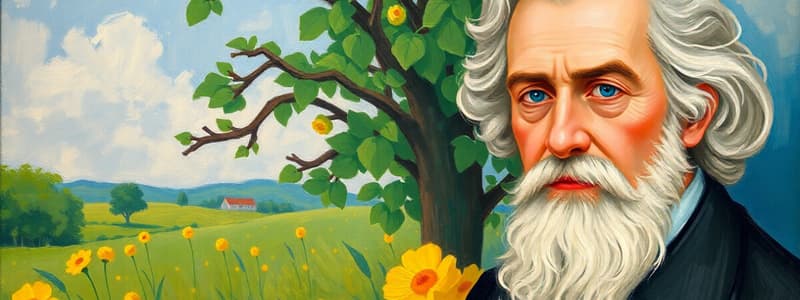Podcast
Questions and Answers
Which composition is considered one of the most difficult pieces in the piano repertoire?
Which composition is considered one of the most difficult pieces in the piano repertoire?
- Valses Nobles et Sentimentales
- Sonatine for Piano
- Gaspard de la Nuit (correct)
- Pavane for a Dead Princess
What musical quality distinguishes Ravel's style from Debussy's?
What musical quality distinguishes Ravel's style from Debussy's?
- Spontaneity in instrumentation
- Use of dissonant harmony
- Casual portrayal of themes
- Attention to classical norms (correct)
What influence did Richard Wagner have on Arnold Schoenberg?
What influence did Richard Wagner have on Arnold Schoenberg?
- He inspired Schoenberg's dissonant style.
- He taught Schoenberg music theory directly.
- He encouraged Schoenberg to compose operas.
- He influenced Schoenberg's writing of symphonic poems. (correct)
Which of the following works is a commemoration of Francois Couperin?
Which of the following works is a commemoration of Francois Couperin?
Which element of Schoenberg's music is noted for its complexity?
Which element of Schoenberg's music is noted for its complexity?
What was George Gershwin's first Broadway musical?
What was George Gershwin's first Broadway musical?
In what year was Ravel's 'Bolero' completed?
In what year was Ravel's 'Bolero' completed?
What characteristic is associated with Debussy's approach to music?
What characteristic is associated with Debussy's approach to music?
Which of the following composers influenced George Gershwin?
Which of the following composers influenced George Gershwin?
Which of the following works is recognized as the only American opera included in the established repertory?
Which of the following works is recognized as the only American opera included in the established repertory?
Which of Ravel's works is known for its harmonic evolution?
Which of Ravel's works is known for its harmonic evolution?
What phrase best describes George Gershwin's musical style?
What phrase best describes George Gershwin's musical style?
Which major event marked Leonard Bernstein's rise to fame?
Which major event marked Leonard Bernstein's rise to fame?
What did Bernstein believe was the universal language of music?
What did Bernstein believe was the universal language of music?
How many musical compositions did George Gershwin create?
How many musical compositions did George Gershwin create?
What is the term used to describe Gershwin as he successfully combined serious and popular music?
What is the term used to describe Gershwin as he successfully combined serious and popular music?
Which characteristic best describes Debussy's approach to music composition?
Which characteristic best describes Debussy's approach to music composition?
What was the significance of Debussy winning the Prix de Rome in 1884?
What was the significance of Debussy winning the Prix de Rome in 1884?
Which of the following works is considered one of Debussy's most famous operatic pieces?
Which of the following works is considered one of Debussy's most famous operatic pieces?
Which of the following composers was NOT identified as an outstanding proponent of Impressionism?
Which of the following composers was NOT identified as an outstanding proponent of Impressionism?
Which composition by Debussy is known for its innovative harmonies and textural treatments?
Which composition by Debussy is known for its innovative harmonies and textural treatments?
What was a primary influence on Debussy's musical style?
What was a primary influence on Debussy's musical style?
What is the total number of compositions attributed to Debussy?
What is the total number of compositions attributed to Debussy?
Which among the following best represents the style of Debussy's piano compositions?
Which among the following best represents the style of Debussy's piano compositions?
Which musical is Leonard Bernstein best known for?
Which musical is Leonard Bernstein best known for?
What is a characteristic style of Philip Glass's music?
What is a characteristic style of Philip Glass's music?
Which opera did Philip Glass produce in collaboration with Robert Wilson?
Which opera did Philip Glass produce in collaboration with Robert Wilson?
What year was the musical Candide premiered?
What year was the musical Candide premiered?
What aspect of Bernstein's career involved ensuring the integrity of his musical values?
What aspect of Bernstein's career involved ensuring the integrity of his musical values?
Which of the following works did Philip Glass NOT compose?
Which of the following works did Philip Glass NOT compose?
Which musical event was the Mass written for?
Which musical event was the Mass written for?
How did Philip Glass's early exposure to music influence his career?
How did Philip Glass's early exposure to music influence his career?
What is a key feature of Chance Music as developed by John Cage?
What is a key feature of Chance Music as developed by John Cage?
What was the significance of Cage's composition Four Minutes and 33 Seconds?
What was the significance of Cage's composition Four Minutes and 33 Seconds?
What innovative method did John Cage use on the prepared piano?
What innovative method did John Cage use on the prepared piano?
Which aspect of Cage's life notably inspired his work Music of Changes?
Which aspect of Cage's life notably inspired his work Music of Changes?
How did John Cage challenge the traditional concepts of music?
How did John Cage challenge the traditional concepts of music?
What does the term 'prepared piano' refer to in John Cage's compositions?
What does the term 'prepared piano' refer to in John Cage's compositions?
What role did natural elements play in Cage's Chance Music?
What role did natural elements play in Cage's Chance Music?
In which artistic endeavor did John Cage involve a cooking process on stage?
In which artistic endeavor did John Cage involve a cooking process on stage?
Flashcards are hidden until you start studying
Study Notes
Impressionist Movement in Music
- Key representatives include French composers Claude Debussy and Maurice Ravel, shaping 20th-century music.
- Notable international impressionist composers: Ottorino Respighi (Italy), Manuel de Falla and Isaac Albeniz (Spain), Ralph Vaughan Williams (England).
Claude Debussy (1862-1918)
- Influential 20th-century composer and primary exponent of impressionism.
- Revolutionized harmony, rhythm, texture, and form; born in St. Germain-en-Laye, France.
- Attended Paris Conservatory starting in 1873; known for rebellious approach in music theory.
- Won Prix de Rome in 1884 for "L'Enfant Prodigue," leading to two years of study in Rome.
- Key works include:
- "Ariettes Oubliees"
- "Prelude to the Afternoon of a Faun"
- "Pelleas et Melisande" (1895) - met with mixed reactions for its innovative style.
- "La Mer" (1905) - atmospheric orchestral piece about the sea.
- Piano compositions: "Images," "Suite Bergamasque," and "Estampes," with "Claire de Lune" as a signature piece.
- Total compositions approximately 227, spanning orchestral, chamber, and vocal music.
- Style marked by deviation from Romantic conventions, favoring free form and fluid themes.
Maurice Ravel (1875-1937)
- Known for adherence to classical norms with an emphasis on structure and craftsmanship.
- Significant works include:
- "Pavane for a Dead Princess" (1899)
- "Jeux d'Eau" (1901)
- "String Quartet" (1903)
- "Miroirs" (1905) - showcases harmonic creativity.
- "Gaspard de la Nuit" (1908) - noted for technical difficulty.
- "Bolero" (1928) - famous orchestral piece with repetitive structure.
Comparative Styles of Debussy and Ravel
- Debussy's music is spontaneous and liberal, focusing more on visual imagery; Ravel is meticulous and formal.
- Both composers share harmonic and textural similarities but differ in compositional philosophy.
Arnold Schoenberg (1874-1951)
- Born in Vienna; self-taught in music theory but studied counterpoint.
- Influenced by Richard Wagner; evolved to dissonance and atonality.
- Developed the twelve-tone technique, impacting future composers.
- Music received mixed reactions: polarizing between hostility and acclaim.
George Gershwin (1898-1937)
- Born to Russian Jewish immigrants in New York; lyrical collaborator with brother Ira.
- Key works: "Rhapsody in Blue" (1924), "An American in Paris" (1928), and opera "Porgy and Bess" (1934).
- Combined jazz rhythms and classical forms; celebrated for melodic innovation.
- Recognized as the “Father of American Jazz” with a diverse oeuvre totaling around 369 compositions.
Leonard Bernstein (1918-1990)
- Esteemed conductor, composer, and lecturer known for charismatic performances.
- Gained prominence conducting the New York Philharmonic in 1943.
- Best known for Broadway musicals, particularly "West Side Story" (1957) and "Candide" (1956).
- Believed in tonality as a universal musical language despite emerging serialist trends.
Philip Glass (born 1937)
- Prominent minimalist composer, integrating various art forms in his work.
- Known for repetitive, evolving patterns and electronic soundscapes.
- Influenced by Indian music; notable works include "Einstein on the Beach" (1976), blending minimalist style with theatrical elements.
- Total compositions around 170, exploring different genres and settings.
John Cage (1912-1992)
- Innovator in 20th-century music, introduced the concept of chance music.
- Famous for "4'33"" - a piece that highlights ambient sound over silence.
- Developed the "prepared piano," altering sound production through various objects placed inside the instrument.
- Engaged with Zen Buddhism, exploring the role of chance in composition.
Studying That Suits You
Use AI to generate personalized quizzes and flashcards to suit your learning preferences.




